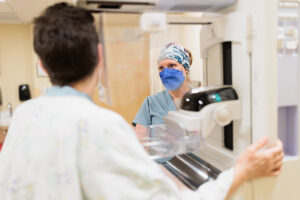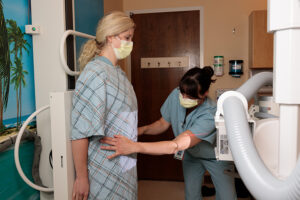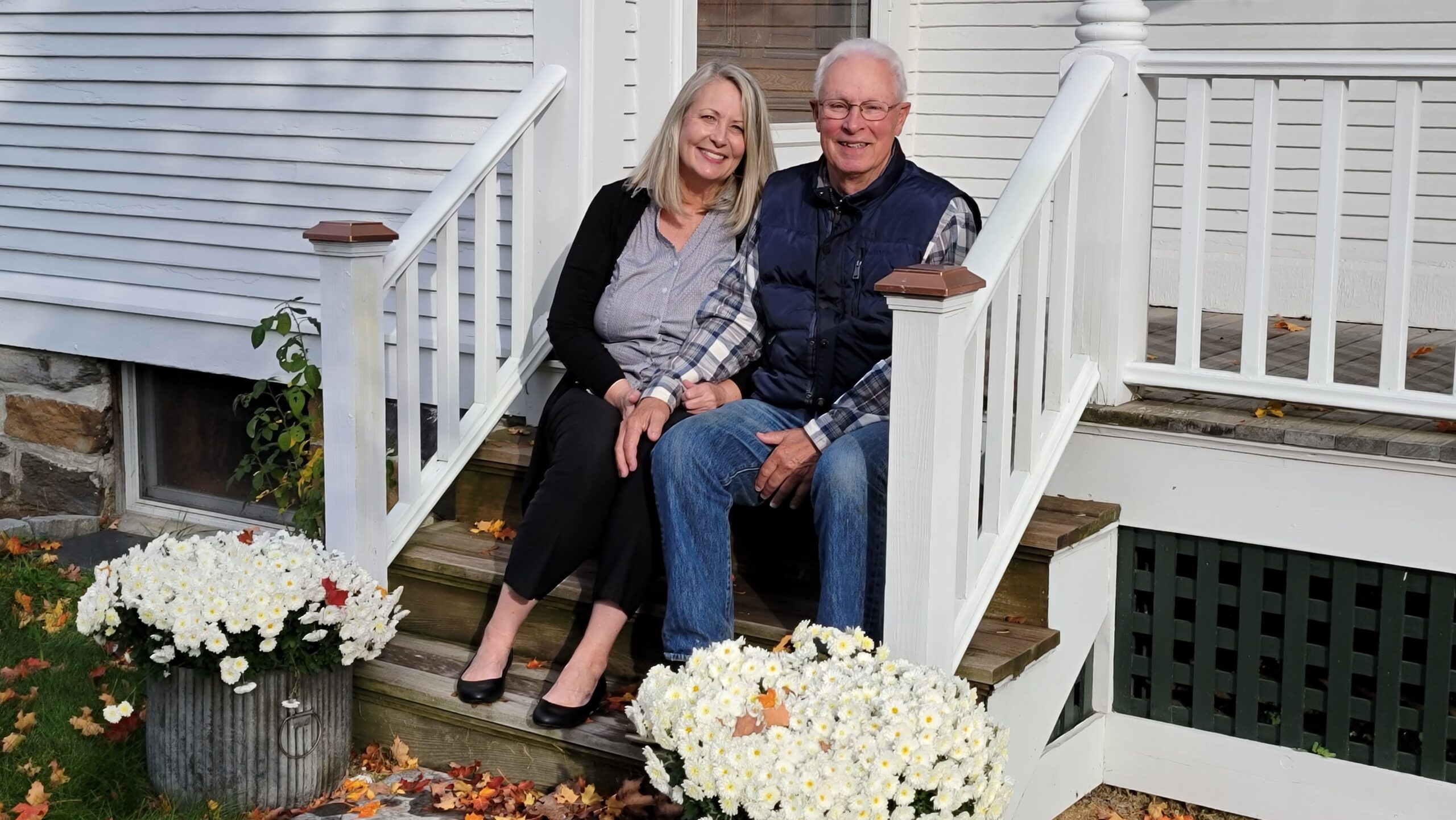
Sam Dorrance and Alice Blackmer moved into their 1890 Victorian home in Milton just before the start of the pandemic in the spring of 2020. The couple looked forward to renovating it and with people being asked to stay home, there was no shortage of improvement projects to pass the time.
From room renovations to growth in the garden, Sam and Alice were experiencing a happy homestyle. However, as summer turned to fall in their simple surroundings, life was about to take a scary turn. Sam started experiencing back pain. He thought it could be from the hours of house painting on a ladder or some other strenuous chore. But Sam’s pain increased to an excruciating level, forcing Alice to make an emergency drive to Northwestern Medical Center in St Albans. Sam was subjected to a scan that determined a diagnosis no one ever wants to hear, stage 4 prostate cancer.
“It didn’t sink in right away,” Sam said. “Obviously, I was now in for a whole different scenario in terms of working through my back pain than I had envisioned.”
He was immediately referred to Dr. Dennis Sanders, Oncologist at UVM’s Fanny Allen Campus in Colchester. The mission at this point was to determine if the cancer had spread to Sam’s bones. This information was vital for Sam’s treatment and hope for remission. Scheduling the appointment for the scan added to the stress.
“The first available date for the scan was quite a ways off and I was in considerable pain,” Sam said. “Not having a precise date at which the examination could be done to determine all the components of my diagnosis caused a lot of anxiety.”

Alice Blackmer and husband Sam Dorrance
“The process of trying to find an appointment that wasn’t weeks away was going on for days. Meanwhile, Sam’s in terrible pain,” Alice said. “We were scared to death.”
“All of these different offices were working hard to try to find us an appointment for a bone scan, but it’s in the middle of the pandemic,” Sam added.
With despair setting in, Alice woke up one morning with an idea, to call Pam Caron, Director of Ancillary Services at Gifford. Alice and Pam were high school classmates.
Alice recalls texting Pam that morning, “Sam has cancer,” and asking if Gifford does bone scans.
“Pam wrote me back right away and scheduled an appointment for the next day at noon. That’s when everything started to feel like we got a handle on it and it’s going to be all right,” Alice said.
“Alice and I just got ourselves down to Randolph as quickly as we could,” Sam added.
When they arrived at Gifford for the bone scan, Sam, Alice and Sam’s step-daughter were greeted by Pam Caron and one of her team members. Sam remained in a great deal of pain and sitting in a waiting room for any length of time would prove to be very difficult.
“They came up with a room immediately. There was just no fuss at all,” Sam recalled. “They had a very good idea of what I was going through, and they addressed it. It doesn’t get much better than that.”
“That was exactly what we needed at that moment,” Alice added.
“I felt a great deal of empathy for Sam as it was quite clear he was in pain and very scared,” Pam said. “I knew I wanted to do anything in my power to at least take away some of the barriers and anxiety as they were facing a lot of unknowns.”
The bone scan Sam had in Nuclear Medicine that day helped the providers find out if the cancer spread through his body, and if it has spread, how extensive is the damage. Knowing this information drives the prognosis and treatment.
The scan showed the cancer had not spread to Sam’s bones. All of the needed information was passed on to Dr. Sanders. From there, treatment using hormone therapy could begin. The results also revealed Sam had a very large tumor in his back, which was causing the excruciating pain.
“Waiting an extra few weeks while you’ve got a tumor was not an option and Gifford came through,” Alice said. “My connection with Gifford I think was the catalyst for us being able to move forward in the most positive way that we could.”
After approximately eight months of treatment, Sam is in remission. Had Sam not received the bone scan promptly, his treatment may have looked a lot different and his large tumor could have kept growing.
“The best part is that he’s feeling good,” Alice said. “He’s not back to what he was before all of this happened, but he’s pretty close. We’re back to working on the house and the garden. The grandkids are here a lot so it’s just a wonderful place to be.”
From diagnosis to treatment, Sam Dorrance relied on the skilled medical professional Vermont is fortunate to offer. By playing a crucial role in this process, Gifford showed its commitment to caring for patients near and far and how being a partner in health makes all the difference.
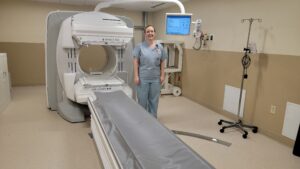
Tera Benson, Nuclear Medicine & EEG Supervisor
“Sam’s story shows that we need to work together to ensure quality health care is available promptly to anyone who contacts us,” Pam said. “My role is to help facilitate and guide patients through a process during a very scary time.”
“When I hear the phrase, Partners in Health, in light of my ongoing experience, I think about working with specialists in various areas who want to know how you’re doing,” Sam said. “Gifford played a part in that, even though the hospital is far from where we live. That’s pretty remarkable. So I would say if you find a good partner in health, stick with them.”
Gifford’s Radiology Department offers comprehensive diagnostic imaging services. Diagnostic imaging is completely digital, meaning images are available electronically to the medical center’s providers as soon as they’ve been completed. Radiology images are read by a team of highly-qualified, specialized physicians.
Gifford’s Radiology Services
- Bone Densitometry
- Computed Tomography (CT)
- Diagnostic X-rays
- Digital (computerized) Mammography
- Interventional Radiology
- Magnetic Resonance Imaging (MRI)
- Ultrasound
- Stereotactic Breast Biopsies
Efficiency Upgrade
In August 2022, Gifford’s Nuclear Medicine Department started using a new GE SPECT/CT camera for patients. The Nuclear Medicine Department performs exams ranging from heart, gallbladder and bone, to gastrointestinal bleeds and pulmonary embolisms.
Gifford also recently started performing a procedure that helps diagnose Parkinsonian Syndrome vs. Essential Tremor. These tests will benefit the most from Gifford’s upgrade to the new SPECT/CT as the combined scan provides precise information about how the body is working and more clearly identify problems.
The camera provides better images for Gifford’s Radiologists, which leads to more accurate interpretations. Also with this new camera, Gifford can image patients weighing up to 500 pounds, reducing the number of patient transfers.
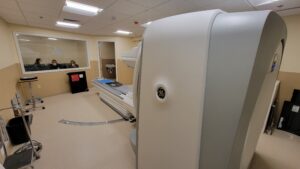
Gifford’s new GE SPECT/CT camera
“We are very excited to have this new Gamma Camera in our Department,” Gifford Nuclear Medicine Supervisor, Tera Benson said. “The multiple exams we perform with this camera are imperative to providing quality care for our patients at Gifford.”

